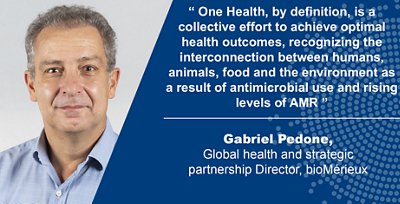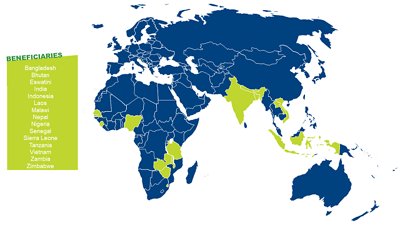Fleming Fund Supports Global AMR Surveillance Network
By the bioMérieux Editors | Reading time: 3 min
PUBLICATION DATE : NOVEMBER 22 , 2022
Collecting and analyzing antimicrobial resistance (AMR) data at a global level is key to slowing the spread of AMR, directing public health decisions and ultimately informing patient care. The Fleming Fund is a UK aid program that supports international AMR monitoring and surveillance efforts with a special focus on low- and middle-income countries (LMICs). Since 2019, bioMérieux has partnered with the Fleming Fund to provide high medical value diagnostic solutions, innovative data analytics tools and antimicrobial susceptibility testing in 15 countries located in the Africa and Asia Pacific regions.
A sponsored session about the value and impact of building data networks to monitor infectious diseases was presented at the 2022 World AMR Congress in Washington, DC, in September. One of the speakers, Gabriel Pedone, is a global health and strategic partnership director at bioMérieux.
LMICs face many challenges to implementing an AMR surveillance network, from external factors, infrastructural issues and gaining support from public health authorities.
“There are often too few trained microbiologists to undertake the volume of testing required for representative surveillance on AMR, and too few hospitals that conduct routine antimicrobial susceptibility testing (AST),” explains Gabriel Pedone.
Quality assurance standards in laboratory testing may be unclear or unevenly applied. Significant logistic challenges present another barrier to AMR data collection, including transporting samples in a safe and secure manner, maintaining laboratory equipment and ensuring a quality supply chain for reagents.
At a national or a public health level, there may be little perceived use of surveillance data and low interest from policy makers to prioritize efforts. Existing surveillance systems at national and regional levels may not be integrated or linked to larger data networks. A lack of education about the concept of One Health can stunt the growth of collaboration across various economic sectors.

The Fleming Fund seeks to address these challenges to AMR surveillance by investing in:
- Laboratory infrastructure enhancement
- Human resource strengthening and workforce reforms
- Surveillance systems strengthening
- Building foundations for AMR surveillance data use
- Promoting rational use of antimicrobial medicines
Diagnostics tools provide data for effective epidemiologic and AMR surveillance systems, which are critical for predicting, managing and preventing infectious disease outbreaks at global, national, regional and local levels. Hospitals and health systems can leverage diagnostic data to track infectious disease trends within their facilities and networks, including the emergence of resistant pathogens.
Diagnostics tools provide data for effective epidemiologic and AMR surveillance systems, which are critical for predicting, managing and preventing infectious disease outbreaks at global, national, regional and local levels. Hospitals and health systems can leverage diagnostic data to track infectious disease trends within their facilities and networks, including the emergence of resistant pathogens.
“Armed with those insights, healthcare providers can take actions to positively impact patient outcomes and improve operations across the continuum of care,” says Gabriel.
Analyzing AMR data with integrated, advanced analytics can be used in the development of national antibiotic guidelines to guide antibiotic treatment for patients based on the local epidemiology and known AMR rates. These guidelines will impact antibiotic prescribing in selected countries and improve the treatment of serious bacterial infections while assisting clinicians to ensure antibiotics are used correctly.
 Through the Fleming Fund, bioMérieux equips laboratories in 15 countries
Through the Fleming Fund, bioMérieux equips laboratories in 15 countries
The AMR data from these monitoring systems supported by the Fleming Fund will become part of the WHO’s Global Antimicrobial Resistance and Use Surveillance (GLASS) database to help inform stewardship strategies at a global level and paint a fuller picture of today’s challenges. AMR surveillance data from all the sentinel surveillance sites will be reported to central reference laboratories to be merged, analyzed, cleared and submitted to GLASS. Resistance and antibiotic use data from sectors will be collected and analyzed in sector specific data bases and then merged at national level for sharing with policy makers for informed decision making.
As a world leader in infectious disease diagnostics, bioMérieux has made antimicrobial stewardship one of its priorities. The company was chosen by the Fleming Fund as a partner due to the outstanding performance of its diagnostic solutions, its organizational capacity in the targeted countries and its extensive expertise in training healthcare professionals in microbiology and AMR.
Awareness, education, equipping laboratories with high-quality diagnostic solutions and surveillance tools are all essential to combat antimicrobial resistance. bioMérieux is proud to have been chosen by the Fleming Fund to take part in this important program and is dedicated to help curb this public health threat.
SHARE THIS:
- AMR AMS
< SWIPE FOR MORE ARTICLES >




